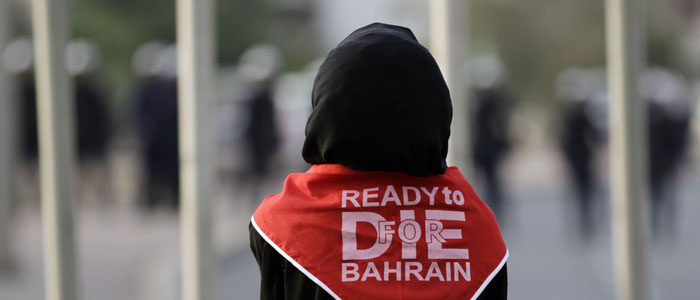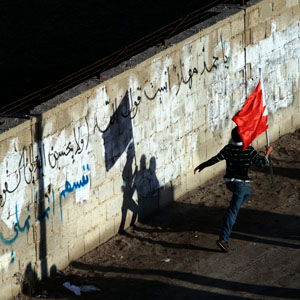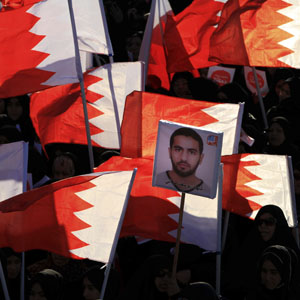
Remember in May 2011 when U.S. President Barack Obama told the government of Bahrain “you can’t have a real dialogue when parts of the peaceful opposition are in jail?” The people of Bahrain do, but many doubted a real dialogue would be possible.
Since President Obama’s call for talks, there has been no real political dialogue in Bahrain. The human rights crisis persists and much of the peaceful opposition remains silenced in jail. Nonetheless, it looks like some sort of talks will open in the coming days.
 Recently, King Hamad of Bahrain, through the minister of justice, announced a new round of dialogue. The plan was met with wild enthusiasm from foreign governments, which are eager to see stability restored to the tiny kingdom following two years of turmoil stemming from pro-democracy protests in February 2011. Opposition parties and human rights leaders, however, remember how a previous “national dialogue” in July 2011 turned out to be a sham have had a more measured response to the latest announcement.
Recently, King Hamad of Bahrain, through the minister of justice, announced a new round of dialogue. The plan was met with wild enthusiasm from foreign governments, which are eager to see stability restored to the tiny kingdom following two years of turmoil stemming from pro-democracy protests in February 2011. Opposition parties and human rights leaders, however, remember how a previous “national dialogue” in July 2011 turned out to be a sham have had a more measured response to the latest announcement.
For one thing, the talks are planned to take place against a backdrop of continued repression. Bahrain remains an absolute monarchy despite widespread calls for democratic reform. The king appoints the cabinet, of whom about half at any one time are members of his family. He can change the constitution at will and his uncle has been the country’s unelected prime minister for the past 41 years. Following the 2011 protests, thousands of people were arrested, including prominent human rights leaders, peaceful opposition figures, labor officials, medics and others. No one at a senior level has yet been brought to justice for their arbitrary detention and the widespread incidents of torture that took place while they were held in custody, a fact the government acknowledges.
“[Some fear that] such talks, without the government directly participating or negotiating, will be another fake exercise for international consumption.” – Brian Dooley, Human Rights First
As grim as those facts may be, there is widespread agreement that Bahrain desperately needs a solution to its crisis. There is also widespread skepticism that the dialogue format that the ruling family is proposing will result in serious negotiations. Government spokesperson Samira Rajab said the government “will be present, but as a coordinator…. Its role will be to implement the recommendations of the participants at the dialogue.” Bahrain’s foreign minister confirmed that the government won’t “interfere” – that is to say actively participate – in discussions between various parties.

A Bahraini anti-government protester carries a national flag as he runs during a march in the western village of Malkiya, February 3, 2013. Graffiti on the wall refers to Bahrain's King Hamad. It reads: "Oh, Hamad, did you forget God's words?" and goes into a verse from the Quran about injustice. (AP)
That format, human rights figures and opposition leaders say, is not what is needed to address the Bahraini crisis. They note that the proposed format looks less like a dialogue and more like a monitored one-sided conversation. As one of the main opposition parties observed in a letter to the government on January 29, being an observer facilitating others to talk “is based on a wrong interpretation of the crisis…The participants’ representation in the negotiations must be fair, the opposition on one side, and the [government] authority on the other.”
The fear among some civil society figures is that such talks, without the government directly participating or negotiating, will be another fake exercise for international consumption. Jalila al Salman, vice president of the Bahrain Teachers Association, served several months in prison for her part in the democracy protests. She told me, “Is this just to show the world that we are having a thing called dialogue in order to reduce the criticism against the government? This will be part of the government propaganda to shine its image.”
Others rightly argue that real talks are impossible while the government continues its crackdown. Since the announcement of the talks, dozens more people have been arrested for protesting in the capital, Manama, and the family of an eight year-old boy reports that he died after a police tear gas attack. The government said he died from “severe pneumonia.”

Bahraini anti-government protesters wave national flags and carry signs during a march to demand freedom for political prisoners and democracy, in Muharraq February 4, 2013. Arabic on the image at right reads, "Martyr Yousef Mowali." (AP)
The human rights activists and opposition figures President Obama referred to in May 2011 remain in jail and there is no sign that they will soon be released. Other civil society figures remain targets of harassment, including judicial harassment. Said Yousif Almuhafdah, a senior figure at the Bahrain Center for Human Rights (BCHR), was back in court this week on charges of tweeting false information. His case was again adjourned, this time until March 4. “The crackdown gives you some indication that the government is not ready for real dialogue. It should create a good environment by releasing all prisoners of conscience, stop the attacks on protestors and hold accountable the killers and torturers,” Said told me.
He added, “Another issue is that the government is trying to show that the problem in Bahrain is sectarian – between Shias and Sunnis. The Sunnis didn’t kill our people, the Sunnis didn’t sack people from their jobs, the Sunnis didn’t arrest our doctors, our human rights defenders and activists, but the government did. The dialogue should be with royal family.”
The United States government has often failed to find its voice when it has needed to on Bahrain. The presence of the U.S. Navy’s Fifth Fleet in the Kingdom appears to have complicated matters, seeming to at times mute U.S. criticisms of human rights violations. In May 2011, President Obama was right when he said you can’t have a serious dialogue with some of the peaceful leadership in prison. He is still right and it might be a nice reminder if he said it again.
This post was authored exclusively for MEV by Human Rights First.
The views expressed in this Insight are the author’s own and are not endorsed by Middle East Voices or Voice of America. If you’d like to share your opinion on this post, you may use our democratic commenting system below. If you are a Middle East expert or analyst associated with an established academic institution, think tank or non-governmental organization, we invite you to contribute your perspectives on events and issues about or relevant to the region. Please email us through our Contact page with a short proposal for an Insight post or send us a link to an existing post already published on your institutional blog.
Pingback: Today’s News Links: 02-09-13 | Material Truth